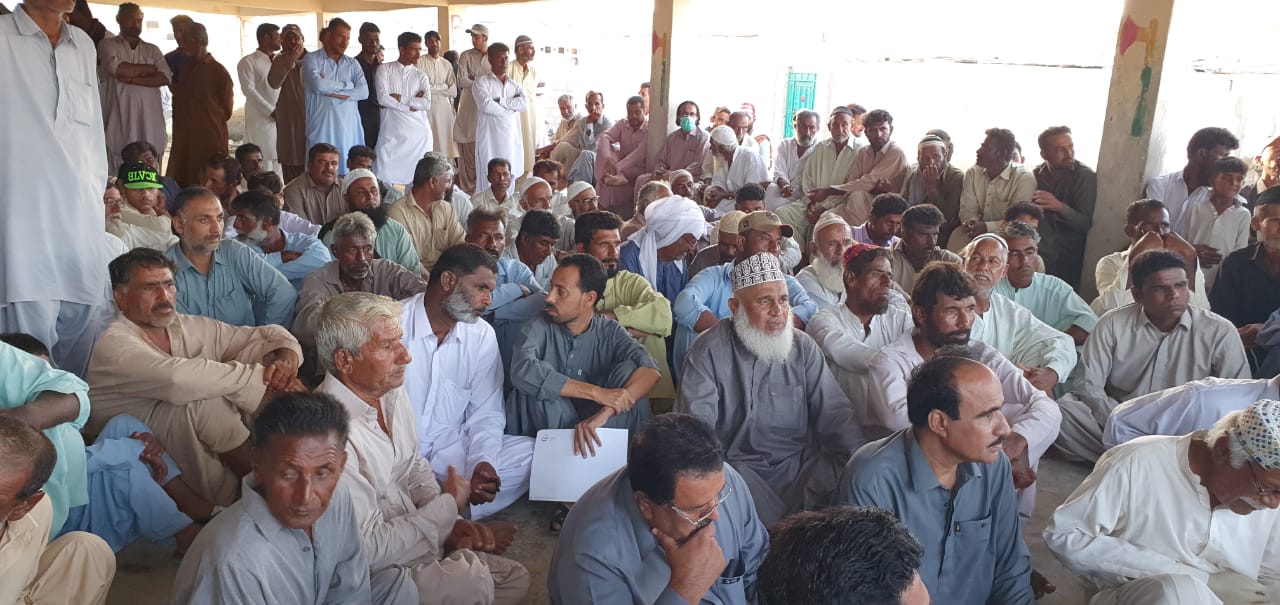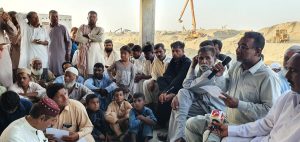In a warm and sunny September evening, hundreds of Gwadar’s fishermen, young and old, gather in Dhoria – a neighborhood of fishermen in the north of Gwadar’s old town. While Khuda Dad Waju, representative of a local organization working for fishermen’s rights, speaks about the rights of the indigenous population and government’s broken promises, others around him listen cautiously.
The attention of the listeners speaks to their concerns, and the urgency of the matter they have gathered for. It will determine whether or not they will be able to provide meals for their families in the next few months and years to come.
This gathering in Dhoria is part for of a larger protest which first began in 2018 after construction work for the East Bay Expressway kicked off. The expressway is a 19-kilometer road and railway link that connects Gwadar Port with the Makran Coastal Highway.
Among many other development schemes in Gwadar, this is one of the “early harvest” projects of the larger China-Pakistan Economic Corridor (CPEC). However, the indigenous population has since 2018 been concerned over their right to live and work in their ancestral land and the impact of development.
“We fear, what they [the government authorities] call ‘development,’ will marginalize our freedoms in our own land and ocean,” the protesters say. This concern of deprivation and being left out has stirred a restiveness among the local population for years now, but their recent protests are specifically about a breakwater. A breakwater is a structure that is built out into a body of water to protect the coast from waves, often generated by large ships passing through. The protesters demand such a breakwater be built in the East Bay of Gwadar.
In 2018, the fishermen forum, a local organization working for the rights of fishermen, drafted a charter of demands for the government authorities. Among many other demands, a 1,500-meter long and 800-meter wide breakwater was a key priority. But as the construction work continued, this structure didn’t appear.
“As usual, fishermen are protesting for their very rights to have access to the sea as well as for the safety of their boats. But their concerns are growing as they [government authorities] keep cancelling tenders. This is delaying the process. And now, they have thrown another ball in the court,” KB Firaaq, a local activist says, referring to “environmental protection.”

Fishermen gather in Gwadar to protest what they say are broken government promises. Photo by Mariyam Suleman.
Many protesters believe that environmental protection was not a concern when the expressway construction began and when the government approved the fishermen’s list of demands. But now it is.
“This is only another way to delay the implementation of the projects or an excuse to cancel them out altogether. In April 2019, when Prime Minister Imran Khan visited Gwadar, he announced the allocation of funds for the projects the indigenous population demanded for but that now seems another broken promise like many others,” Younas Anwar a representative of the fishermen says. “A public hearing with the authorities in the environmental protection agency was also recently cancelled.”
“We now doubt if any such structure is even part of the overall construction-plan of expressway,” says one of the fishermen in the Dhoria gathering.
On the other hand, the minister for finance in Balochistan, Zahoor Bulaidi, told The Diplomat, “All the projects connected with [the] expressway approved earlier, are still part of the overall plan. Construction work for some have already started and few are in tendering process.”
The finance ministry is hopeful and assures that while it might take a while, the projects are not yet cancelled. Nevertheless, the fishermen in Gwadar’s Dhoria now more than ever are worried over their rights to live and work in a place they have always known as home.
































